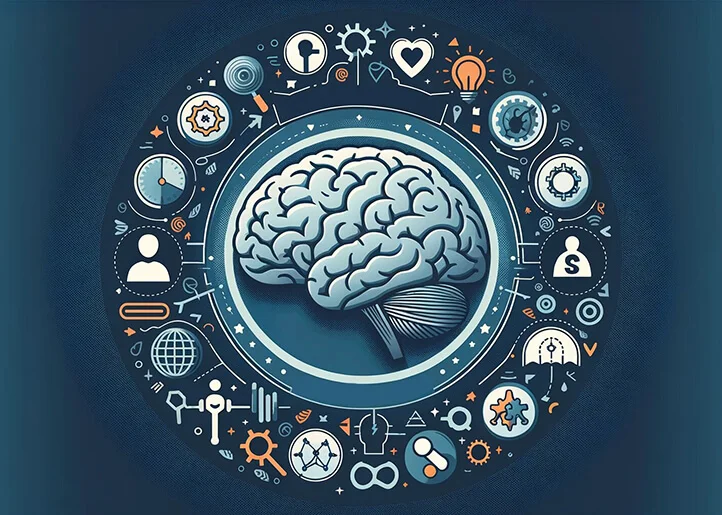Rehabilitation psychology is a key area in clinical psychology focused on helping people who have experienced severe physical or psychological trauma, illnesses, or chronic conditions. This type of psychology emphasizes restoring functionality, improving quality of life, increasing independence, and enhancing social adaptation of patients.
In rehabilitation psychology, special attention is given to the development and application of individualized strategies aimed at helping patients adapt to new life conditions after trauma or illness. It includes both psychotherapeutic work and various methods of psychological counseling.
Professionals in this field work closely with medical specialists, physiotherapists, social workers, and other experts to provide a comprehensive approach to treatment and rehabilitation. The main goal here is not only physical recovery but also psychological rehabilitation, including building resilience, managing emotions, and returning to active social life.
Rehabilitation psychology also encompasses research aimed at understanding the best ways to support people during their recovery process and developing new methods that can be applied in clinical practice. This research helps continuously improve approaches to psychological rehabilitation, making them more effective and targeted.
The significance of rehabilitation psychology in the modern world is immense, especially in light of the growing number of people facing chronic illnesses, combat-related injuries, trauma, and psychological disorders. This field plays an important role in improving quality of life and contributes to faster and fuller recovery of patients after various life challenges.
- Support after injuries and illnesses. Rehabilitation psychology helps people cope with the consequences of serious injuries and illnesses, including chronic diseases, disabilities, and mental disorders. It offers strategies and techniques to alleviate physical and emotional discomfort.
- Improving quality of life. Rehabilitation psychology specialists focus not only on physical recovery but also on improving the overall quality of life of patients. This includes helping restore social skills, self-confidence, and the ability to live independently.
- Promoting social integration. Special attention is given to returning patients to active social life, restoring professional skills, and adapting to new circumstances.
- Psychological support and counseling. Rehabilitation psychology provides emotional support and strategies for overcoming the psychological consequences of injuries, helping people cope with stress, anxiety, depression and other emotional problems.
- Interdisciplinary approach. This field involves collaboration with various medical and social specialists to ensure a comprehensive approach to patient treatment and recovery.
- Research and innovation. Rehabilitation psychology also contributes to the development of new treatment methods and rehabilitation approaches through scientific research and innovations.
It can be said with confidence that rehabilitation psychology plays a crucial role in modern medicine and social work, helping people recover from severe challenges and return to a fulfilling life.

History of Rehabilitation Psychology
The history of rehabilitation psychology is closely linked to the development of medicine and psychology as a whole, as well as changes in societal attitudes toward disability and rehabilitation.
Rehabilitation psychology began to take shape in the early 20th century, when approaches to treating and rehabilitating patients after injuries and illnesses started to be actively developed in medicine and psychology. A significant impetus for the development of this field came from both world wars, which created an urgent need for the psychological rehabilitation of soldiers who had suffered injuries and trauma.
After World War II, developed countries started actively developing rehabilitation programs for war veterans. This contributed to the development of rehabilitation psychology as an independent field. During this time, the understanding emerged that rehabilitation should include not only physical but also psychological recovery.
In the 1950s and 1960s, the first professional organizations and journals dedicated to rehabilitation psychology appeared, which contributed to its academic development and the standardization of practices. During this time, more attention was also paid to research and the development of methods in this area.
From the 1970s onward, rehabilitation psychology began to expand its influence, covering not only war veterans but also civilians with various types of disabilities and chronic illnesses. This field began actively including topics related to employment, education, and social integration of people with disabilities.
Today, rehabilitation psychology is an important and respected field in psychology that continues to develop, incorporating new research, technologies, and methods into its practice. There are many programs and centers offering specialized rehabilitation psychology services, and it is actively integrated into the overall healthcare and social support systems in many countries.
Thus, rehabilitation psychology has evolved from an auxiliary field focusing on a narrow range of problems to a multidisciplinary and comprehensive field that significantly impacts the lives of many people.

Rehabilitation Psychology: Theoretical Foundations
Rehabilitation psychology, emerging at the intersection of clinical psychology and medicine, is based on deeply entrenched theoretical foundations that have been developed over decades, incorporating knowledge from various fields such as health psychology, neuropsychology, and social psychology. It is important to understand that each of these theories contributes uniquely to the understanding of rehabilitation and recovery processes, providing psychologists with a solid foundation for practical work.
Throughout the history of the discipline, a key turning point was the integration of theoretical knowledge into rehabilitation practice. This allowed specialists not only to better understand the needs and experiences of their patients but also to approach the recovery process more effectively. Theories underpinning rehabilitation psychology address many aspects—from mechanisms of overcoming psychological trauma to methods of social adaptation and integration.
Among the many concepts and approaches presented in rehabilitation psychology, particular attention is paid to understanding how individual differences in perception and information processing influence the recovery process. This knowledge helps to shape more targeted and personalized strategies for interacting with patients, which is key to successful rehabilitation.
Another important component of the theoretical base is the understanding of the social and emotional aspects of recovery. Maintaining social connections, developing communication skills, and managing emotional responses all play a crucial role in the rehabilitation process. This theoretical knowledge significantly influences the formation of effective recovery methods, enabling high results in working with patients.
Key Concepts and Approaches in Rehabilitation Psychology
Rehabilitation psychology relies on a number of key concepts and approaches that define its practical activities and research work. These concepts and approaches include:
- Holistic approach to treatment. Rehabilitation psychology does not focus solely on narrow aspects of diseases or injuries; it considers the person as a whole, including their physical, psychological, social, and emotional state. The goal is not only physical recovery but also the achievement of psychological well-being.
- Individualized approach. Considering the uniqueness of each person and their situation, rehabilitation psychology employs individualized methods. These allow for consideration of personal characteristics, as well as the patient’s cultural and social context.
- Multidisciplinary interaction. Rehabilitation psychology closely collaborates with other areas of medicine and social work. This enables the creation of multidisciplinary teams for a comprehensive approach to patient recovery.
- Chronic condition management. Special attention is given to patients with chronic diseases. Strategies are developed for managing illness, teaching patients self-management skills, and maintaining quality of life.
- Psychological support and counseling. A key component is psychological support aimed at helping patients cope with stress, anxiety, depression, and other emotional difficulties related to illness or injury.
- Facilitating social adaptation. Rehabilitation programs often include assistance with social adaptation, restoring professional activity, and improving general communication skills.
- Promoting independence. Developing life skills and increasing self-confidence are key aspects of rehabilitation psychology.
- Scientific approach and evidence base. Decisions and methods in rehabilitation psychology are based on scientific research and evidence, enhancing their effectiveness and appropriateness in various clinical situations.
These concepts provide a comprehensive and deeply individualized approach to the recovery and rehabilitation of patients, contributing to their physical, psychological, and social well-being.
Theories and Models Underpinning Practice
Several key theories and models are used in rehabilitation psychology, forming the basis of practical work in this field. These theoretical approaches provide a framework for understanding and intervening in the rehabilitation process for patients.
- Biopsychosocial model emphasizes that a person’s health and well-being depend on the interaction of biological, psychological, and social factors. In the context of rehabilitation, this means that treatment must take into account not only the physical aspects of illness or injury but also the patient’s psychological state and the influence of their social environment.
- Self-efficacy theory, developed by Albert Bandura, focuses on an individual’s belief in their ability to successfully handle various situations. In rehabilitation practice, this means supporting patients in developing confidence in their abilities, which is a key factor in successful adaptation and recovery.
- Stress management model examines how people respond to stressful situations and what strategies they use to cope with them. In rehabilitation psychology, this helps to develop individual strategies for managing stress associated with illness or injury.
- Theory of planned behavior explains how a person’s beliefs, attitudes towards behavior, and perception of social pressure influence their intentions and actions. In rehabilitation practice, this aids in understanding and changing patient behavior towards a healthier lifestyle and adherence to medical recommendations.
- Bronfenbrenner’s ecological model considers the influence of various levels of environment (from family and school to culture and society) on individual development. In the context of rehabilitation psychology, this highlights the importance of considering all levels of influence when planning recovery.
- Social learning model emphasizes how people learn by observing others. In rehabilitation practice, this is used to develop training programs where patients can learn from those who have successfully overcome similar challenges.
These theories and models provide a comprehensive approach to rehabilitation, enabling specialists to develop more effective recovery strategies tailored to the individual needs of each patient.

Transition from Theory to Practice
The transition from theory to practice in rehabilitation psychology marks the moment when knowledge and research turn into real actions and methods aimed at helping people. This process requires not only a deep understanding of theoretical foundations but also the ability to adapt this knowledge to specific situations and individual patient needs. The importance of such an approach cannot be overstated, as it represents a bridge between academic research and real clinical practice.
During this transition, particular attention is paid to applying theoretical concepts in various clinical contexts. Enriched by numerous studies and theoretical developments, rehabilitation psychology faces the challenge of turning this vast information into effective strategies for treating and supporting patients. Such an approach demands not only professionalism but also the creative application of knowledge.
A key aspect of this transition is a deep understanding of how different theories can be adapted and integrated into practical work. This not only enriches the professional experience of psychologists but also enhances the effectiveness of patient support, stimulating their recovery and improving their quality of life.
Applying theory in practice also implies continuous learning and professional development. Rehabilitation psychology is a dynamically evolving field, where new research and developments constantly influence work methods. This flexibility and willingness to embrace innovations are key to successful practical work in this field.
Application of Theoretical Knowledge in Practice
The application of theoretical knowledge in practical work in rehabilitation psychology plays a critically important role, ensuring the effectiveness and focus of interventions. This process includes several key aspects:
- Adaptation of theories to individual needs. Every patient is unique, and the needs of each individual in rehabilitation can vary significantly. Applying theoretical knowledge involves adapting general principles to specific cases, taking into account the individual characteristics, cultural, and social context of the patient.
- Integration of various approaches. Rehabilitation psychology often requires combining different theoretical models and approaches. For example, a combination of cognitive-behavioral therapy and resilience development and stress management methods may be used.
- Application of scientific data in clinical practice. Modern rehabilitation psychology practice is based on evidence. This means that the methods and techniques used by professionals should be supported by current research and scientific data.
- Development of individualized rehabilitation programs. Using theoretical knowledge, specialists design personalized rehabilitation plans, which may include exercises, therapeutic sessions, problem-solving skill training, and more.
- Evaluation and adjustment of approaches. Applying theory in practice requires continuous monitoring of the effectiveness of the chosen methods and their adjustment in line with the patient’s condition changes.
- Promoting interdisciplinary collaboration. In rehabilitation psychology, cooperation with other professionals, such as doctors, physical therapists, and social workers, is crucial to providing a comprehensive approach to recovery.
- Training and counseling. In the rehabilitation process, it is important not only to apply theoretical knowledge in treatment but also to teach patients self-help and self-regulation methods.
- Self-development. It is important for specialists not only to apply theories but also to constantly incorporate their own experience, study new research, and methods, improving their skills and knowledge.
The application of theoretical knowledge in rehabilitation psychology represents a dynamic and multifaceted process requiring deep understanding, flexibility, and creative approaches to each case.
Examples of Successful Theory Application
There are numerous examples of successful application of theoretical approaches in rehabilitation psychology that have helped patients achieve significant improvements in their conditions. Here are some illustrative examples:
- Application of Cognitive Behavioral Therapy (CBT) in treating chronic pain: One patient, suffering from chronic pain due to injury, underwent a course of CBT. By working on his thought processes and behavioral reactions, he learned to manage pain, which significantly improved his quality of life.
- Use of self-efficacy theory in stroke rehabilitation: A stroke patient had difficulty restoring motor functions. Through a program focused on enhancing self-efficacy (including tasks of increasing complexity and positive reinforcement), he was able to significantly improve his physical skills and regain independence.
- Bronfenbrenner’s ecological model in working with children with special needs: In the case of a child with special educational needs, an ecological model was applied, involving interaction with the school, family, and other social agents. This helped create a supportive environment that promoted the child’s development and successful social integration.
- Multidisciplinary approach in treating post-traumatic stress disorder (PTSD): A patient with PTSD received comprehensive care, including psychotherapy, pharmacotherapy, and social support. Psychotherapy focused on processing traumatic memories, while social support helped restore social connections and daily activities.
These case examples from practice demonstrate how theoretical knowledge in rehabilitation psychology can be successfully applied to solve specific tasks and improve patients’ lives. They underscore the importance of an integrated approach and individualized treatment tailored to the unique needs of each patient.

Methods and Techniques in Rehabilitation Psychology
Rehabilitation psychology, enriched with a deep understanding of the human mind and behavior, offers a wide range of methods and techniques to support and improve the lives of people facing various challenges. These diverse and multifaceted methods are the result of decades of research and practical experience accumulated in this field. They encompass a broad spectrum of approaches, from traditional psychotherapeutic techniques to more innovative and specialized methods adapted to specific needs and circumstances.
The importance of these methods and techniques lies in their ability to provide an individualized approach to recovery and rehabilitation. Each patient represents a unique story, requiring special attention and a tailored approach. In this context, rehabilitation psychology demonstrates its flexibility and adaptability by offering specialized strategies and techniques aimed at meeting individual needs.
The use of these methods and techniques in clinical practice requires not only deep knowledge but also a creative approach. Rehabilitation psychologists must be able to integrate theoretical knowledge with practical skills and apply various approaches flexibly depending on the specific situation. This helps create the most productive and personalized rehabilitation programs.
The effectiveness of these methods and techniques is confirmed by years of practice and research in the field of rehabilitation psychology. They contribute not only to the improvement of patients’ physical condition but also have a positive impact on their emotional well-being, social adaptation, and overall quality of life.
Overview of Various Methods and Techniques
Rehabilitation psychology encompasses many different methods and techniques, each with its unique advantages and areas of application. These methods help patients recover from injuries, illnesses, and psychological difficulties, improving their quality of life and facilitating adaptation to new conditions. Here are some of the main methods and techniques used in rehabilitation psychology:
- Cognitive-Behavioral Therapy (CBT): This method focuses on changing negative thought and behavioral patterns that may affect the recovery process. It is particularly effective in treating depression, anxiety, and chronic pain.
- Motivational Interviewing: A directive, client-centered counseling style aimed at resolving ambivalence and supporting internal motivation for change. It is especially useful for patients who are uncertain about the need to change their behavior or lifestyle.
- Problem-Solving and Skills Training: Involves teaching patients methods for solving problems and stressful situations, developing self-help skills, time management, and decision-making.
- Relaxation Techniques: Deep breathing, meditation, and progressive muscle relaxation are used to manage stress, improve concentration, and enhance emotional well-being.
- Family Therapy: An approach that involves the patient’s family in the rehabilitation process. This helps improve understanding, support, and communication within the family, contributing to more successful recovery.
- Group Therapy: Conducting sessions with groups of patients allows people to share experiences, support each other, and learn from others’ examples.
- Resilience Training: Developing skills that help patients overcome difficulties, improve emotional well-being, and increase resilience to stress.
- Biofeedback and Neurofeedback: Using body feedback (e.g., heart rate) to teach patients self-regulation techniques.
- Positive Psychotherapy: Aimed at enhancing positive emotions, behavior, and thinking, which helps improve mood and overall patient well-being.
- Existential Therapy: An approach that aims to help patients find meaning and purpose, especially in the context of experiencing trauma or illness.
These methods and techniques are just part of the diversity of tools available to rehabilitation psychologists. They can be adapted and combined depending on the specific needs and goals of each patient, providing a deeply personalized approach to rehabilitation.
Examples of Effective Use in Different Contexts
The effective use of various methods and techniques in rehabilitation psychology can vary significantly depending on the context and specific needs of patients. Here are some examples illustrating how these approaches are applied in different situations:
- Recovery from Physical Injury: A patient who has experienced a serious physical injury suffers from chronic pain and emotional difficulties. A combination of cognitive-behavioral therapy for managing pain and thought processes along with physical therapy can be effective in improving the patient’s physical and psychological condition.
- Supporting Patients with Chronic Illnesses: For patients with chronic illnesses, such as diabetes or heart disease, motivational interviewing can be used to strengthen their motivation to follow treatment recommendations and lead a healthy lifestyle.
- Treatment of Psychological Trauma: When working with patients suffering from post-traumatic stress disorder (PTSD), methods such as EMDR (Eye Movement Desensitization and Reprocessing) and cognitive-behavioral therapy can help process traumatic memories and reduce anxiety symptoms.
- Social Adaptation in Disability: For people facing disability, group therapy and family counseling can be helpful in improving social support, communication, and adaptation to new life circumstances.
- Working with the Elderly: When working with elderly patients, especially those suffering from cognitive impairment or depression, techniques such as positive psychotherapy and cognitive-behavioral therapy help improve mood and cognitive function.
- Supporting Children and Adolescents with Special Needs: For children and adolescents with special educational or behavioral needs, methods such as play therapy and behavioral interventions are applied to develop social skills and improve academic performance.
These examples illustrate the adaptability and versatility of rehabilitation psychology techniques in addressing a wide range of issues and helping patients improve their lives.

The Future of Rehabilitation Psychology
In the future, rehabilitation psychology will undoubtedly continue to evolve and integrate new technologies and approaches. One of the key directions is the implementation of digital innovations, such as health-related mobile apps, virtual and augmented reality, which can offer new methods for treatment and rehabilitation. These technologies enable the creation of more personalized and accessible treatment programs, improving access to services for various population groups.
The development of neuroscience also plays a crucial role in the future of rehabilitation psychology. Understanding the brain mechanisms underlying different psychological and physical conditions will allow for the development of more effective methods of treatment and recovery.
Special attention is also given to the development of interdisciplinary approaches, combining knowledge and methods from various fields, such as medicine, psychology, physiotherapy, and social work. This will ensure more comprehensive and holistic recovery for patients.
The influence of rehabilitation psychology on society will continue to grow, as it not only improves the health and well-being of individuals but also strengthens social integration and support, reduces the economic burden of chronic diseases, and enhances overall quality of life. This field will continue to adapt to the changing needs of society, offering new and innovative ways to assist those facing psychological and physical challenges.




